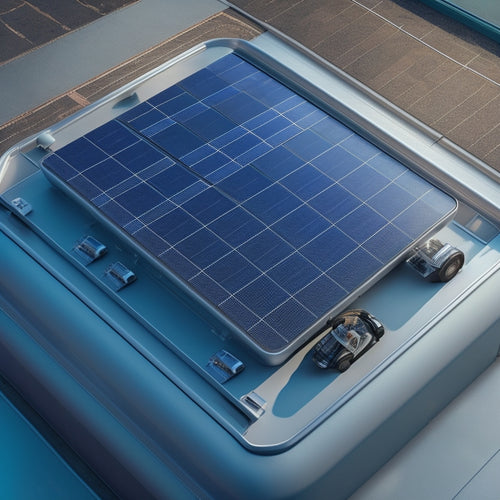
Boost Your Home's Value With Solar Energy
Share
By installing solar panels, you can increase your home's value by up to $15,000 and reap a range of benefits that extend far beyond just financial gains. You'll attract like-minded buyers willing to pay a premium for sustainable living, and your home will sell for up to 17% more than similar non-solar homes. Plus, you'll save on energy bills, reduce your carbon footprint, and enjoy long-term energy independence. And with government incentives and rebates, the cost of going solar is lower than you think. Want to harness the full potential of solar energy for your home?
Key Takeaways
• Solar-equipped homes sell for up to 17% more than similar non-solar homes, increasing property value by up to $15,000.
• Solar panels are a desirable feature for many homebuyers, increasing the resale value of homes and attracting eco-conscious buyers.
• Installing solar panels can boost a home's value by providing a competitive edge in the market and attracting like-minded buyers.
• Solar energy can impact neighborhood trends, attracting eco-friendly buyers who are willing to pay a premium for sustainable living.
• Solar panels are taken into account during the appraisal process, resulting in a higher selling price and a significant return on investment.
Increased Property Value Guaranteed
By installing solar panels, you can substantially boost your property's value, with studies showing that solar-equipped homes sell for up to 17% more than similar non-solar homes.
This significant increase in value can be attributed to the Appraisal Benefits that come with solar energy. When it's time to sell, a solar-powered home is viewed as a premium product, giving you a competitive edge in the market.
Additionally, solar panels can also impact Neighborhood Trends, as eco-friendly homeowners attract like-minded buyers who are willing to pay a premium for sustainable living.
In fact, a study by the National Renewable Energy Laboratory found that solar panels can increase property value by up to $15,000. By going solar, you're not only reducing your carbon footprint but also making a savvy investment in your property.
Reduced Carbon Footprint Benefits
You can substantially shrink your carbon footprint by switching to solar energy, which reduces greenhouse gas emissions and mitigates climate change.
By harnessing the power of the sun, you'll dramatically decrease your reliance on fossil fuels and lower your home's carbon emissions.
This not only benefits the environment but also enhances your reputation as a responsible member of your community.
You'll be demonstrating environmental stewardship, which can instill community pride and set a positive example for others to follow.
As you reduce your carbon footprint, you'll be contributing to a cleaner, healthier environment for generations to come.
Solar energy is a clean and renewable source of power, producing no emissions or pollution.
By making the switch, you'll be doing your part to combat climate change and preserve the planet's natural resources.
Lower Monthly Energy Bills
As you consider switching to solar energy, you'll be thrilled to learn that one of the most significant benefits is the potential to slash your monthly energy bills.
By harnessing the power of the sun, you'll reduce your reliance on the grid and lower your energy consumption, which translates to lower utility costs.
This means you'll get to enjoy significant savings on your monthly energy bills, putting more money back in your pocket!
Reduced Energy Consumption
Switching to solar energy can substantially slash your monthly energy expenditures, freeing up more of your hard-earned cash for the things that matter most.
With solar panels, you'll greatly reduce your reliance on the grid, thereby decreasing your energy consumption. This, in turn, leads to lower monthly energy bills and a more sustainable lifestyle.
As you shift to solar energy, you'll notice a marked improvement in your home's energy efficiency.
Your smart home will become even smarter, with solar energy optimizing your energy usage and reducing waste.
You'll have greater control over your energy consumption, making it easier to identify areas for improvement and make data-driven decisions.
Lower Utility Costs
Solar energy systems substantially reduce your reliance on the grid, resulting in substantially lower monthly energy bills that can save you hundreds or even thousands of dollars per year. By harnessing the power of the sun, you'll enjoy significant cost savings and budget relief, freeing up more money in your household expenses for the things that matter most.
| Energy Efficiency | Cost Savings | Bill Reduction |
|---|---|---|
| 15-20% reduction in energy consumption | $500-$1,000 annual savings | 20-30% lower monthly bills |
| Optimized energy usage patterns | Increased property value | Reduced reliance on the grid |
| Smart energy management | Improved energy independence | Enhanced energy security |
With solar energy, you'll experience a significant decrease in your energy bills, allowing you to allocate more resources to other important areas of your life. By reducing your reliance on the grid, you'll also increase your energy independence and security. By choosing solar, you're taking control of your household expenses and making a smart investment in your future.
Government Incentives and Rebates
As you explore the world of solar energy, you'll discover that government incentives and rebates can substantially reduce the upfront costs of installing solar panels.
Federal tax credits, for instance, can cover up to 26% of your total solar panel system cost.
Additionally, state and local incentives can provide further discounts, making your solar energy investment even more attractive.
Federal Tax Credits
By investing in solar energy, you can substantially reduce your tax liability with federal tax credits, which offer a dollar-for-dollar reduction in your federal income taxes.
As a homeowner, you're eligible for the Solar Investment Tax Credit (ITC), which allows you to claim a substantial portion of your solar panel system's cost as a credit against your federal income taxes. This means you can subtract the credit amount directly from your tax bill, reducing your liability.
To be eligible for the ITC, you must meet certain credit eligibility requirements.
For instance, you must have purchased the solar panel system and have it installed on your primary or secondary residence in the United States. Additionally, you must have a tax liability to claim the credit against.
The good news is that you can carry over any unused credits for up to 20 years, providing long-term tax benefits.
State and Local Incentives
You can further boost your solar savings by exploring the array of state and local incentives, which often complement federal tax credits and provide additional financial benefits.
These incentives can substantially reduce the upfront cost of solar installation, making it more accessible and affordable for homeowners like you.
For instance, some states offer rebates or grants for solar installations, while others provide exemptions from sales taxes or property taxes.
Additionally, local governments may have their own set of incentives, such as municipal perks or local ordinances that encourage the adoption of solar energy.
By taking advantage of these incentives, you can maximize your solar savings and enjoy a faster return on investment.
Be sure to research the specific incentives available in your area, as they can vary widely depending on your location.
With a little digging, you can uncover the perfect combination of federal, state, and local incentives to supercharge your solar savings.
Improved Home Resale Value
Installing solar panels on your home can substantially boost its resale value, with a study by the National Renewable Energy Laboratory showing that homes with solar panels sell for up to $15,000 more than similar homes without them.
This significant increase in value is attributed to the fact that solar panels are a desirable feature for many homebuyers. During the appraisal process, the added value of solar panels is taken into account, which can result in a higher selling price.
Additionally, buyer perception plays a significant role in the resale value of your home. Many buyers are willing to pay a premium for homes with solar panels, as they perceive them as a valuable asset that can save them money on energy costs in the long run.
Enhanced Energy Independence
With solar energy, you're no longer beholden to the grid, freeing you from the whims of utility companies and their fluctuating rates.
This means you're in control of your energy costs, and you can say goodbye to those pesky rate hikes.
By harnessing the power of the sun, you're taking a major step towards energy self-sufficiency.
You're producing your own clean energy, reducing your reliance on non-renewable sources, and minimizing your carbon footprint.
Renewable systems like solar energy give you the power to take charge of your energy needs.
You're no longer at the mercy of utility companies, and you can rest easy knowing that your energy costs are fixed.
This level of energy independence is priceless, and it's a major selling point for potential buyers if you ever decide to sell your home.
By investing in solar energy, you're not only saving money in the long run, but you're also increasing your home's value and appeal.
Take control of your energy needs today and reap the benefits of energy independence!
Long-Term Savings Assurance
By switching to solar energy, homeowners can lock in a fixed energy rate for the next 25 years or more, effectively shielding themselves from rising electricity costs and ensuring a significant reduction in their overall energy expenditure.
This long-term savings assurance is a vital aspect of solar energy, providing you with a sense of financial security and stability.
With solar energy, you can hedge against inflation and rising energy costs.
You can enjoy predictable energy bills, reducing your financial risk.
You can increase your cash flow by redirecting savings towards other important expenses.
You can enhance your property value, making it more attractive to potential buyers.
Frequently Asked Questions
Do Solar Panels Affect the Roof's Integrity or Durability?
You'll be relieved to know that solar panels don't compromise your roof's integrity! In fact, a thorough roof inspection and structural analysis guarantee a secure installation that won't compromise your roof's durability.
Can I Install Solar Panels on an Old or Historic Home?
"As you ponder renovating your treasured historic home, remember that installing solar panels can be a harmonious marriage of innovation and preservation, respecting architectural integrity while embracing a sustainable future."
Are Solar Panels Noisy or Disruptive to Daily Life?
You'll be thrilled to know that solar panels are remarkably quiet, producing almost no noise pollution, and their sleek design minimizes visual impact, allowing you to harness renewable energy without disrupting your daily life.
Can I Install Solar Panels Myself to Save Money?
"Taking the DIY route can be tempting, but be aware that improper installation may void warranties and compromise efficiency. Weigh the DIY incentives against Professional Costs - is the savings worth the potential risks and headaches?"
Will Solar Panels Still Generate Power During a Blackout?
During a blackout, you'll still generate power with solar panels, but you won't be able to use it without an Emergency backup system, ensuring grid reliability; invest in a battery backup to keep the lights on!
Related Posts
-

Why Choose Solar Car Battery Charging Systems?
You're switching to a cleaner, more sustainable transportation option by choosing solar car battery charging systems,...
-

Top Solar Panels for Car Battery Maintenance
When selecting top solar panels for car battery maintenance, consider high-efficiency models with high wattage output...
-

What Makes a Road Bike-Friendly by Design?
As you plan and design roads, incorporating features like dedicated bike lanes, smooth surfaces, and traffic calming ...


